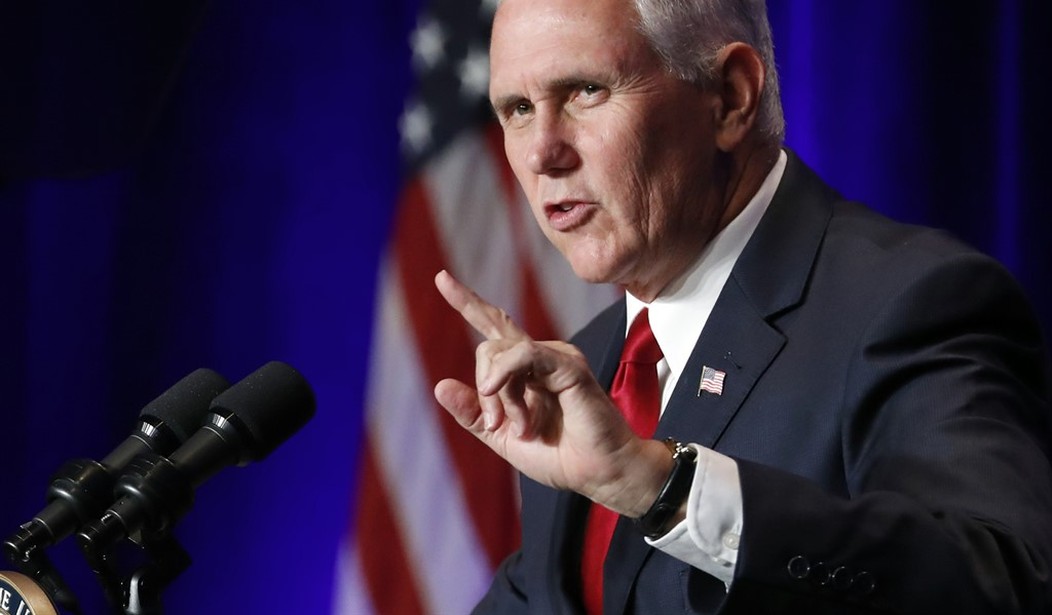Will Donald Trump run for a second term in 2020? Does anyone in 2017 care about it? Only “the shadow” knows — the shadow campaign that the New York Times reports is preparing for a one-term Trump presidency. Among those keeping his options open is Vice President Mike Pence, whom the Times report is “creating an independent power base” and getting key personnel into position. Just in case, of course:
The vice president created his own political fund-raising committee, Great America Committee, shrugging off warnings from some high-profile Republicans that it would create speculation about his intentions. The group, set up with help from Jack Oliver, a former fund-raiser for George W. Bush, has overshadowed Mr. Trump’s own primary outside political group, America First Action, even raising more in disclosed donations.
Mr. Pence also installed Nick Ayers, a sharp-elbowed political operative, as his new chief of staff last month — a striking departure from vice presidents’ long history of elevating a government veteran to be their top staff member. Mr. Ayers had worked on many campaigns but never in the federal government. …
Mr. Pence has made no overt efforts to separate himself from the beleaguered president. He has kept up his relentless public praise and even in private is careful to bow to the president.
Mr. Pence’s aides, however, have been less restrained in private, according to two people briefed on the conversations. In a June meeting with Al Hubbard, an Indiana Republican who was a top economic official in Mr. Bush’s White House, an aide to the vice president, Marty Obst, said that they wanted to be prepared to run in case there was an opening in 2020 and that Mr. Pence would need Mr. Hubbard’s help, according to a Republican briefed on the meeting. Reached on the phone, Mr. Hubbard declined to comment.
Pence wasted little time in responding to this report, calling it “laughable and absurd,” and using the opportunity to lionize Trump:
Vice President Pence on Sunday sought to tamp down speculation that he is preparing for his own 2020 White House bid, characterizing the notion as “both laughable and absurd.”
“My entire team will continue to focus all our efforts to advance the President’s agenda and see him re-elected in 2020,” Pence said in the statement in which he praised President Trump’s work on job creation, rebuilding the military and fighting terrorism. …
“The American people know that I could not be more honored to be working side by side with a president who is making America great again,” Pence said, asserting that the media has been trying to divide the Trump administration.
It’s absurd for Pence, surely. The only political path for a sitting VP to challenge for the party’s nomination is in the case of a retirement by the incumbent. The only time in recent memory that such a move took place was in 1968, when Lyndon Johnson declined to run for a second term of his own. Only then did VP Hubert Humphrey throw his hat in the ring, with LBJ’s blessing, and won by focusing all of his efforts on caucus states (then the vast majority at 36). Pence will have no room to push aside Trump, nor does it appear to be his desire.
That doesn’t mean that other Republicans will refrain from challenging Trump in the primaries. John Kasich has all but declared his intent to test the waters in 2020, and Trump’s consistently low approval ratings will act as an incentive too, no matter how reliable they turn out to be. Usually, the party’s fundraising infrastructure and discipline discourage serious bids against incumbent presidents, but occasionally a president angers enough in the party to open up a tough internecine fight. That’s what happened in 1968 with Eugene McCarthy and Robert Kennedy to convince LBJ to retire, to Gerald Ford in 1976 with Ronald Reagan, in 1980 with Ted Kennedy and Jimmy Carter, and in 1992 with Pat Buchanan and George H. W. Bush.
What do all those have in common? The incumbent party lost the general election. That will be the White House response to any such campaigns, should they actually arise. If the GOP suffers a wipeout in the House in next year’s midterms, that may not be enough to forestall a challenge. If, however, the Trump administration successfully instills enough discipline to get its agenda through Congress and manages some more wins in foreign policy like the UN vote this weekend on North Korea sanctions, the GOP may do all right in the midterms and eliminate the incentives for a challenge in 2020.








Join the conversation as a VIP Member